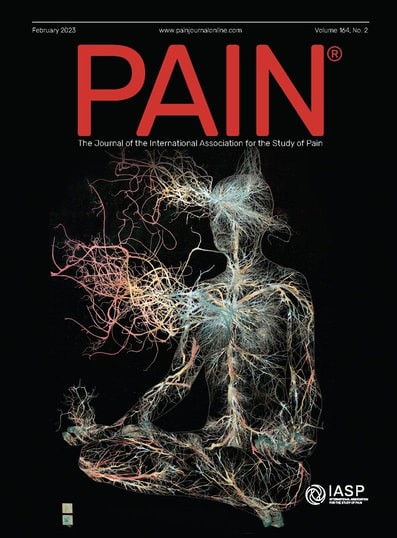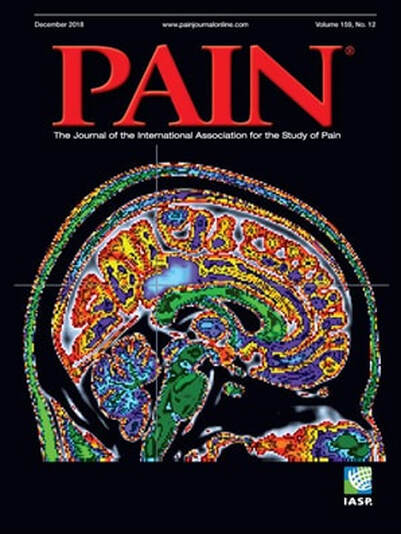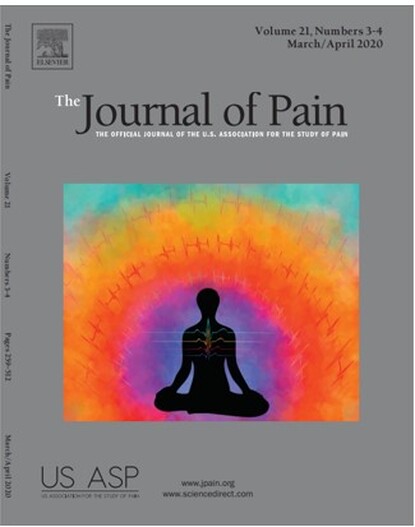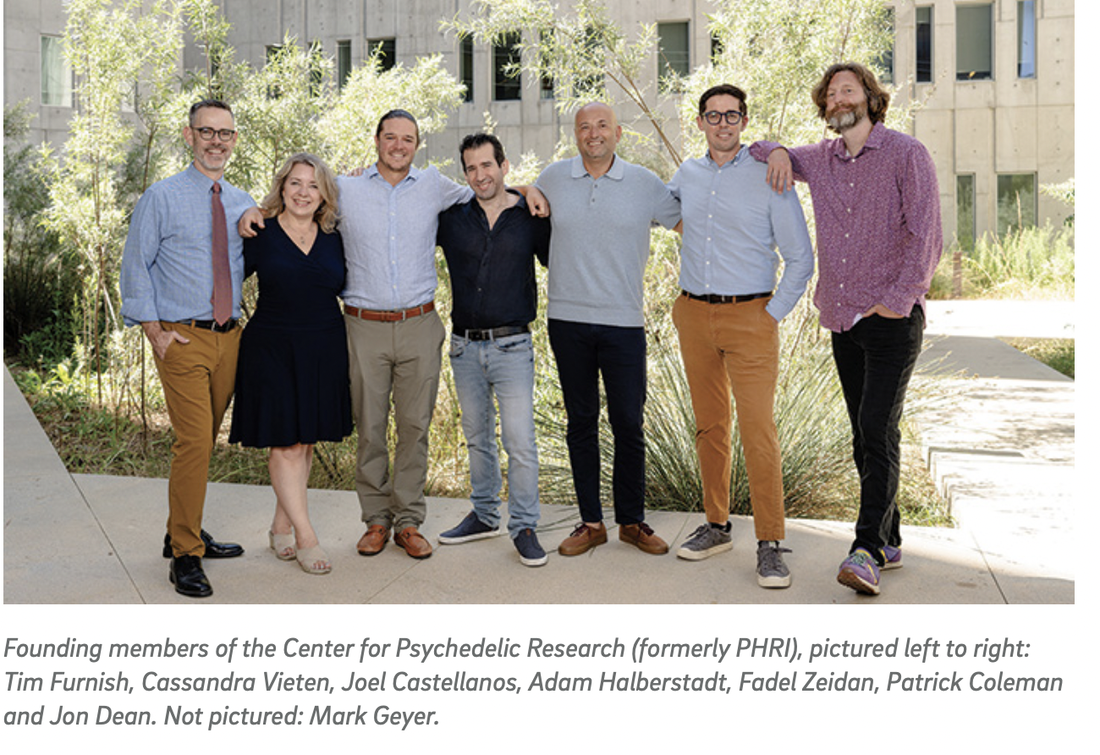|
Khatib, L. , Dean, J.G., Oliva, V., Riegner, G., Gonzalez, N., Birenbaum, J., Cruanes, G., Miller, J., Patterson, M., Kim, HC, Chakravarthy, K., and Zeidan, F. The role of endogenous opioids in mindfulness and sham mindfulness-meditation for the direct alleviation of evoked chronic low back pain: a randomized clinical trial. Neuropsychopharmacology. 2023 Nov (ePub ahead of print).
Oliva V, Riegner G, Dean J, Khatib LA, Barrows D, Chen C, Mosbey D, Lopez C, Allen A, Uvarova A, Reyes M, Fuentes R, Jacobson A, Liu T, Zeidan F. I feel your pain: Higher empathy is associated with higher posterior default mode network activity. bioRxiv [Preprint]. 2023 Aug 15:2023.08.11.553004. doi: 10.1101/2023.08.11.553004. PMID: 37645854; PMCID: PMC10462016. Riegner G, Posey G, Oliva V, Jung Y, Mobley W, Zeidan F. Disentangling self from pain: mindfulness meditation-induced pain relief is driven by thalamic-default mode network decoupling. Pain. 2023 Feb 1;164(2):280-291. doi: 10.1097/j.pain.0000000000002731. Epub 2022 Jul 7. PMID: 36095039; PMCID: PMC9823141. Khatib L, Riegner G, Dean JG, Oliva V, Cruanes G, Mulligan BA, Zeidan F. The Effects of Mindfulness-Based Stress Reduction on Trauma in Victims of Gun Violence: a Pilot Study. Mindfulness. 2022;13(4):1032-1041. doi: 10.1007/s12671-022-01858-y. Epub 2022 Mar 22. PMID: 35341090; PMCID: PMC8938160. Case L, Adler-Neal AL, Wells RE, Zeidan F. The Role of Expectations and Endogenous Opioids in Mindfulness-Based Relief of Experimentally Induced Acute Pain. Psychosomatic Medicine. 2021 Jul-Aug 01;83(6):549-556. doi: 10.1097/PSY.0000000000000908. PMID: 33480666; PMCID: PMC8415135. Zeidan, F., Salomons, T., Farris, S.R., Emerson, N.M., Adler-Neal, A., Jung, Y., Coghill, R.C. (2018). Neural mechanisms supporting the relationship between dispositional mindfulness and pain. PAIN, 159(12): 2477- 2485. May, L.M., Kosek, P., Zeidan, F., & Berkman, E.T. (2018). Enhancement of meditation analgesia by opioid antagonist in experienced meditators. Psychosomatic Medicine. Adler-Neal, A.L. & Zeidan, F. (2017). Mindfulness meditation for fibromyalgia: Mechanistic and clinical considerations. Current Rheumatology Reports 19: 59. Zeidan, F., & Vago, D. (2016). Mindfulness meditation–based pain relief: A mechanistic account. Annals of the New York Academy of Sciences, 1373(1), 114–127. Zeidan, F., Adler-Neal, A., Wells, R.W., Stagnate, E., May, L., Eisenach, J.C., McHaffie, J.G., & Coghill, R.C. (2016). Mindfulness-meditation-based pain relief is not mediated by endogenous opioids. The Journal of Neuroscience, 36(11): 3391–3397.
Garland, E.L., Froeliger, B., Zeidan, F., Partin, K., & Howard, M.O. (2013). The downward spiral of chronic pain, prescription opioid misuse, and addiction: cognitive, affective, and neuropsychopharmacologic pathways. Neuroscience and Biobehavioral Reviews, 37(10,2): 2597-2607. Zeidan, F., Grant, J. A., Brown, C. A., McHaffie, J. G., & Coghill, R. C. (2012). Mindfulness meditation-related pain relief: Evidence for unique brain mechanisms in the regulation of pain. Neuroscience Letters, 520(2), 165–173. Zeidan, F., Martucci, K.T., Kraft, R.A., McHaffie, J.G., & Coghill, R.C. (2013). Neural correlates of mindfulness meditation-related anxiety relief. Social Cognitive and Affective Neuroscience 9(6): 751-759. Zeidan, F., Martucci, K. T., Kraft, R. A., Gordon, N. S., McHaffie, J. G., & Coghill, R. C. (2011). Brain mechanisms supporting the modulation of pain by mindfulness meditation. The Journal of Neuroscience, 31(14), 5540-5548. Zeidan, F. and R. C. Coghill (2013). Functional connections between self-referential thought and chronic pain: a dysfunctional relationship. PAIN, 154(1): 3-4. |
Khatib, L., Glaser‑Reich, J., Mosbey, D., Oliva, V., Riegner, G., Dean, Jon G., Harth, Noriko M., Zeidan, F. (2022) Mindfulness Meditation Training Reduces Aggression and Improves Well‑Being in Highly Stressed Law Enforcement Officers. The Journal of Police & Criminal Psychology. Adler-Neal, A.L., Waugh, C.E., Garland, E.L., Shaltout, H.A., Diz, D.I., & Zeidan, F. (2019). The role of heart rate variability in mindfulness-based pain relief. The Journal of Pain, 0:1-18. Zeidan, F, Baumgartner, J.N., & Coghill, R.C. (2019). The neural mechanisms of mindfulness-based pain relief: a functional magnetic resonance imaging-based review and primer. PAIN Reports, 4: 1-11. Adler-Neal, A.L., Emerson, N.M., Farris, S.R., Jung, Y., Coghill, R.C., & Zeidan, F. (2019). Brain moderators supporting the relationship between depressive mood and pain. PAIN, 0: 1-8. Grant, J. A., & Zeidan, F. (2019). Employing pain and mindfulness to understand consciousness: a symbiotic relationship. Current Opinion in Psychology, 28: 192-197. Vago, D. R., & Zeidan, F. (2016). The brain on silent: Mind wandering, mindful awareness and states of mental tranquility. Annals of the New York Academy of Sciences, 1373: 96–113. Zeidan, F. (2016). No, mindfulness meditation-based analgesia is not mediated by endogenous opioids. The American Journal of Medicine, 129(11), e297. Zeidan, F., Emerson, N.M., Farris, S.R., Ray, J. N., Jung, Y., McHaffie, J. G., & Coghill, R. C. (2015). Mindfulness meditation-based pain relief employs different neural mechanisms than placebo and sham mindfulness meditation-induced analgesia. The Journal of Neuroscience, 35(46): 15307–15325. Zeidan, F., Lobanov, O. V., Kraft, R.A., & Coghill, R.C. (2015). Brain mechanisms supporting violated expectations of pain. PAIN, 156(9): 1772–1785. Emerson, N.M., Zeidan, F., Lobanov, O.V., Hadsel, M.S., Martucci, K. T., Quevedo, A., Starr, C., et al. (2014). Pain sensitivity is inversely related to regional grey matter density in the brain. PAIN, 155(3), 566–573. Lobanov, O.V., Zeidan, F., McHaffie, J.G., Kraft, R.A., & Coghill, R.C. (2013). From cue to meaning: Brain mechanisms supporting the construction of expectations of pain. PAIN, 155(1), 129–136. Zeidan, F., Johnson, S.K., Gordon, N.S., & Goolkasian, P. (2010a). Effects of brief and non mindfulness meditation on mood and cardiovascular variables. The Journal of Alternative and Complementary Medicine, 16(8):867-873. Zeidan, F., Johnson, S.K., Diamond, B.J., David, Z., & Goolkasian, P. (2010c). Mindfulness meditation improves cognition: evidence of brief mental training. Consciousness and Cognition, 19(2):597-605. Zeidan, F., Gordon, N.S., Merchant, J., & Goolkasian, P. (2010b). The effects of brief mindfulness meditation training on experimentally induced pain. The Journal of Pain, 11(3):199-209. Jinich-Diamant, A., Garland, E., Baumgartner, J., Gonzalez, N., Riegner, G., Birenbaum, J., Case, L., & Zeidan, F. (2020). Neurophysiological Mechanisms Supporting Mindfulness Meditation-Based Pain Relief: an Updated Review. Current pain and headache reports, 24(10), 56. Wells, R. E., Collier, J., Posey, G., Morgan, A., Auman, T., Strittmatter, B., Magalhaes, R., Adler-Neal, A., McHaffie, J. G., & Zeidan, F. (2020). Attention to breath sensations does not engage endogenous opioids to reduce pain. PAIN, 161(8), 1884–1893. Zeidan, F., Johnson, S. K., Gordon, N. S., & Goolkasian, P. (2010). Effects of brief and sham mindfulness meditation on mood and cardiovascular variables. Journal of alternative and complementary medicine, 16(8), 867–873. |
AddressUC San Diego Health
Altman Clinical and Translational Research Institute 9452 Medical Center Dr, La Jolla, CA 92037 MC: 0719 |
|





